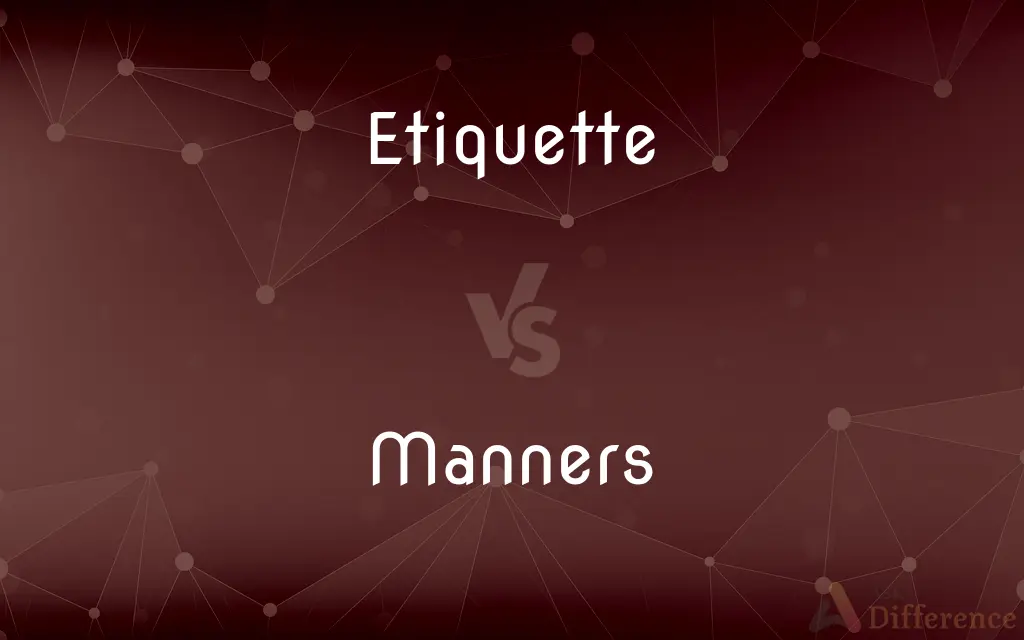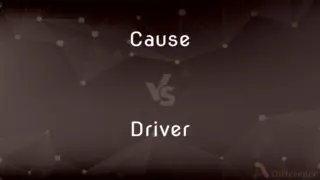Etiquette vs. Manners — What's the Difference?
By Tayyaba Rehman & Fiza Rafique — Updated on March 20, 2024
Etiquette involves formal rules and conventions of behavior in social settings, whereas manners are more about general conduct and respect in interpersonal interactions.

Difference Between Etiquette and Manners
Table of Contents
ADVERTISEMENT
Key Differences
Etiquette refers to the formal codes of behavior expected in specific social or professional settings, emphasizing rituals and formalities. Whereas manners are the fundamental expressions of respect and kindness in daily interactions, transcending formal settings.
Etiquette often varies by culture and setting, involving specific rules like proper dining conduct or greeting rituals. Manners, on the other hand, are universally applicable principles like saying "please" and "thank you," showing a more innate sense of respect towards others.
While etiquette can be learned and varies greatly across different societies, manners are often instilled from a young age, forming the basis of how we interact with others on a fundamental level.
In professional environments, etiquette can dictate the way meetings are conducted or how clients are greeted, whereas manners ensure respectful and considerate communication regardless of the setting.
Etiquette and manners both play crucial roles in social cohesion, but they operate at different levels of interaction, with manners providing the foundation for the more specialized rules of etiquette.
ADVERTISEMENT
Comparison Chart
Definition
Formal codes of behavior in specific settings.
General conduct principles emphasizing respect.
Application
Specific to culture and setting.
Universal across various interactions.
Focus
Rituals and formalities.
Innate sense of respect and kindness.
Learning
Acquired through specific instruction.
Often instilled from a young age.
Professional Relevance
Dictates formal professional interactions.
Ensures respectful communication.
Compare with Definitions
Etiquette
Social Protocols.
Etiquette dictates the proper way to address a letter to a government official.
Manners
Basic Courtesy.
Good manners include saying please and thank you in conversations.
Etiquette
Professional Conduct.
Business etiquette includes exchanging business cards in a certain manner.
Manners
Respectful Interaction.
Displaying good manners involves listening attentively when someone else is speaking.
Etiquette
Dining Rules.
Etiquette requires using the correct fork for each course at a formal dinner.
Manners
Polite Communication.
Apologizing when you've accidentally bumped into someone shows good manners.
Etiquette
Ceremonial Customs.
Wedding etiquette involves a specific sequence of events and dress codes.
Manners
Consideration for Others.
Covering your mouth when you cough or sneeze is considered good manners.
Etiquette
Cultural Variations.
In Japanese etiquette, bowing is a common form of greeting.
Manners
Kind Gestures.
Offering your seat to an elderly person on a bus is a sign of good manners.
Etiquette
Etiquette ( and ; French: [e.ti.kɛt]) is the set of conventional rules of personal behaviour in polite society, usually in the form of an ethical code that delineates the expected and accepted social behaviours that accord with the conventions and norms observed by a society, a social class, or a social group. In modern English usage, the French word étiquette (ticket) dates from the year 1750.
Manners
A way of doing something or the way in which a thing is done or happens
Prepared for the trip in a very organized manner.
Etiquette
The customary code of polite behaviour in society or among members of a particular profession or group
The rules of etiquette are changing
Court etiquette was now familiar to Joan
Etiquette books
Manners
A way of acting; bearing or behavior
He is known for his reserved manner.
Etiquette
The practices and forms prescribed by social convention or by authority.
Manners
The socially correct way of acting; etiquette
Had trouble mastering manners in his new country.
Etiquette
The forms required by a good upbringing, or prescribed by authority, to be observed in social or official life; observance of the proprieties of rank and occasion; conventional decorum; ceremonial code of polite society.
Manners
The prevailing customs, social conduct, and norms of a specific society, period, or group, especially as the subject of a literary work
A novel of 18th-century manners.
Etiquette
The customary behavior of members of a profession, business, law, or sports team towards each other.
Manners
Practice, style, execution, or method in the arts
This fresco is typical of the painter's early manner.
Etiquette
A label used to indicate that a letter is to be sent by airmail.
Manners
Kind; sort
What manner of person is she?.
Etiquette
The forms required by good breeding, or prescribed by authority, to be observed in social or official life; observance of the proprieties of rank and occasion; conventional decorum; ceremonial code of polite society.
The pompous etiquette to the court of Louis the Fourteenth.
Manners
Kinds; sorts
Saw all manner of people at the mall.
Etiquette
Rules governing socially acceptable behavior
Manners
Plural of manner
Manners
Etiquette.
Manners
Social deportment;
He has the manners of a pig
Common Curiosities
Why is etiquette important in formal events?
Etiquette helps maintain decorum and ensures smooth interaction during formal events by providing a set of guidelines for behavior.
How do manners differ from etiquette in professional settings?
In professional settings, manners ensure respectful and considerate communication, while etiquette might dictate specific conduct, like how meetings are run.
Are manners innate or learned?
Manners are generally instilled from a young age and can be considered a part of one's upbringing, though they can also be refined over time.
Is it possible to have good manners but poor etiquette?
Yes, one can be generally respectful and considerate (good manners) but may not be familiar with specific formal codes of behavior (etiquette) in certain settings.
How does social media affect etiquette and manners?
Social media has introduced new forms of etiquette and manners, including how we communicate and interact online, maintaining respect and privacy.
Is it important to teach children about both etiquette and manners?
Teaching children both etiquette and manners is crucial for their social development and for fostering respectful interactions.
Can etiquette rules change over time?
Yes, etiquette rules can evolve with societal changes, reflecting current values and norms.
Can someone learn etiquette later in life?
Yes, etiquette can be learned at any stage in life, often through observation, instruction, and practice.
How does understanding etiquette benefit international relations?
Understanding etiquette can greatly benefit international relations by showing respect for cultural differences and fostering diplomatic interactions.
Can etiquette vary from one culture to another?
Yes, etiquette can significantly vary across different cultures, with each having its own set of formal rules and conventions.
Are there universal aspects of manners?
Yes, some aspects of manners, like showing gratitude and respect, are universally recognized and valued.
Do manners have a role in conflict resolution?
Yes, good manners can play a key role in conflict resolution by promoting respectful communication and understanding.
Is there a difference in etiquette between formal and casual settings?
Yes, there are distinct differences in etiquette between formal and casual settings, with formal settings often requiring more rigid adherence to specific rules.
How do etiquette and manners contribute to societal harmony?
Both etiquette and manners contribute to societal harmony by ensuring respectful, considerate, and orderly interactions among individuals.
How can one improve their manners and etiquette?
Improving manners and etiquette can be achieved through conscious practice, observation, and sometimes formal education or training.
Share Your Discovery

Previous Comparison
Discover vs. Explore
Next Comparison
Cause vs. DriverAuthor Spotlight
Written by
Tayyaba RehmanTayyaba Rehman is a distinguished writer, currently serving as a primary contributor to askdifference.com. As a researcher in semantics and etymology, Tayyaba's passion for the complexity of languages and their distinctions has found a perfect home on the platform. Tayyaba delves into the intricacies of language, distinguishing between commonly confused words and phrases, thereby providing clarity for readers worldwide.
Co-written by
Fiza RafiqueFiza Rafique is a skilled content writer at AskDifference.com, where she meticulously refines and enhances written pieces. Drawing from her vast editorial expertise, Fiza ensures clarity, accuracy, and precision in every article. Passionate about language, she continually seeks to elevate the quality of content for readers worldwide.














































